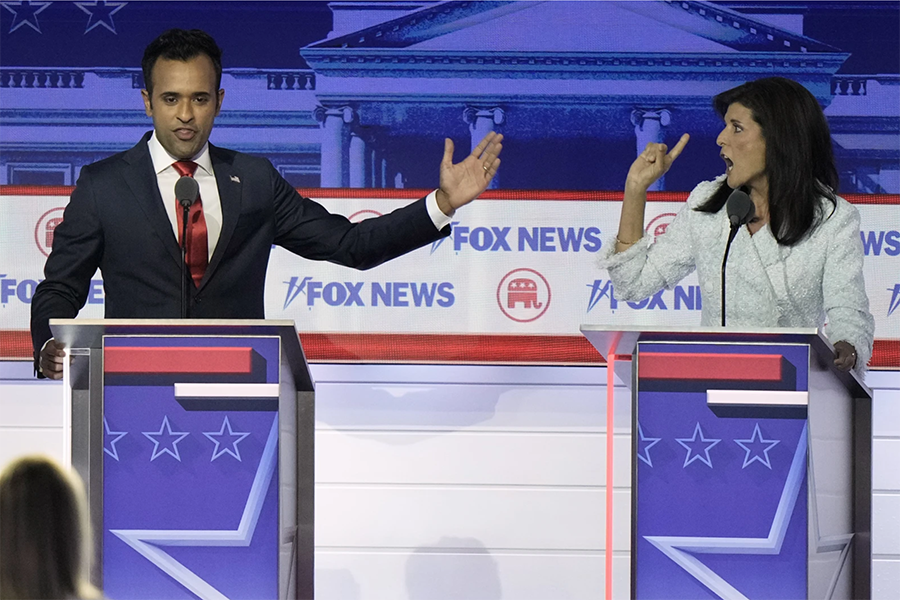In the recent GOP debate, Nikki Haley emerged as the standout winner due to her thoughtful responses and well-rounded experience. As a South Asian descendant herself and only woman on stage, Haley’s insightful responses and depth of experience were on full display, serving as a stark contrast to her fellow South Asian contender, Vivek Ramaswamy. While Haley’s measured approach shone brightly, Ramaswamy’s uninformed stance raised concerns about his grasp of government and governance.

Vivek Ramaswamy and Nikki Haley speak during a Republican presidential primary debate hosted by FOX News Channel in Milwaukee on Aug. 23, 2023. (AP Photo/Morry Gash)
Haley’s victory was evident in her ability to discuss important issues with clarity. Her history of electoral successes and her ability to stand strong in challenging situations showcased her strength as a candidate. As the sole woman in the debate, she didn’t rely solely on identity—she used her insights and convictions to make her mark.
During a crucial moment, Haley addressed the rising budget deficit, stating, “Republicans did this to you too.” Her call for responsible spending struck a chord, highlighting her skill in cutting through political talk and prioritizing accountability.
Haley’s view of former President Donald Trump’s influence was another winning point. She candidly referred to Trump as the “most disliked politician in America,” and warned that the party’s association with him could hurt its chances in the general election.
Haley’s expertise in complex policy discussions came to the fore during the abortion debate. While others called for a federal abortion ban, Haley questioned its viability without enough congressional support. Her argument against demonizing the issue showed her practical approach and commitment to unity in a party often divided by social matters.
In contrast, Vivek Ramaswamy’s performance raised questions about his readiness for government. As a newcomer, his lack of experience showed in his interactions with fellow candidates. While he positioned himself as a Trump-like outsider, his responses lacked depth. His confrontational style sometimes turned into shallow critiques of “professional politicians” and Political Action Committees.
Ramaswamy’s stance on climate change and government bureaucracy drew attention. His assertion that the “climate change agenda is a hoax” disregarded science and hinted at divisive behavior. Additionally, his promise to eliminate the “administrative state” without concrete plans displayed a lack of understanding of governance complexities.
Ramaswamy’s promise to pardon Trump if elected was telling. In contrast, Haley acknowledged Trump’s influence while expressing concerns about his popularity. Ramaswamy’s blanket endorsement appeared uninformed and politically motivated.
In a race needing informed leadership, Nikki Haley’s performance secured her status as the standout candidate. Her sensible approach to key issues, her nuanced foreign policy perspective, and her readiness to address tough truths within her party showcased her as a candidate seeking practical solutions. While Ramaswamy brought energy to the debate, his lack of depth raises concerns about his ability to lead.
As the Republican Party proceeds in the primary race, the comparison between Haley’s wisdom and Ramaswamy’s inexperience will shape opinions. Haley’s informed approach resonates with a party redefining itself, making her the real winner of the debate.


